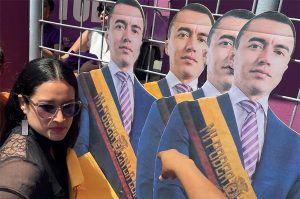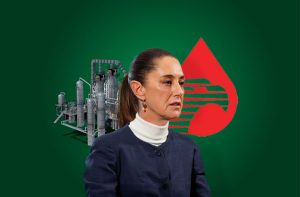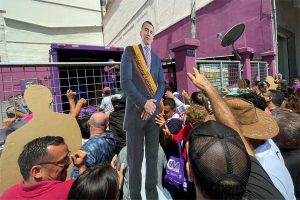
In a reversal of its boycott of the 2018 presidential elections, Venezuela’s main opposition parties have announced their willingness to participate in the country’s 2024 presidential elections, regardless of the conditions imposed by the Maduro regime, reports Bloomberg. The opposition did not participate in Venezuela’s 2018 presidential elections, arguing that they were not free and not fair, a criticism supported both domestically and internationally. Select parts of the opposition also chose to boycott regional elections in 2021, which received similarly supported criticisms of a lack of integrity in the electoral process. Now, though, the opposition plans to unify behind a single candidate who will be chosen in next year’s unified primaries. According to Venezuelan polling firm Delphos, about 77% of Venezuelans plan to vote in the 2024 elections, as compared to a 46% participation rate in the 2018 elections.
On Sunday, the coalition of opposition parties, known as the Plataforma Unitaria, announced it had come to an agreement with members on the regulations for the upcoming primaries, reports Crónica Uno. Members will then vote for a single candidate from a shortlist of about 12 people, including National Assembly President Juan Guaidó, who declared himself Interim President of the country following the 2018 elections, citing fraud and basing his claim on the country’s constitution. Guaidó remains recognized as the de jure president of Venezuela by the United States. Much information on the regulations for the primary has not been made publicly available, drawing criticism of lack of transparency from the Plataforma Unitaria. The accelerated timeline for the opposition primary comes as Maduro has hinted that the presidential election could be held as early as next year, writes Reuters. Last week, Maduro wrote on Twitter that his Socialist Party is ready for elections “whenever, wherever, and however.”
More Venezuela
- In a new report, the International Crisis Group outlines recent geopolitical changes to the way countries are interacting with Nicolás Maduro, offering specific suggestions for how the EU can play an important role in potential negotiations between the government and the opposition.
- A new Transparency International report explores the disinformation machine operated by Russia and Venezuela, says Infobae, noting that one former Telesur employee argued that “Telesur served as a catapult for the penetration of channels such as RT or Arab media such as Al Mayadeen.”

Argentina
- In Eater, Kevin Vaughn analyzes Argentina’s culinary propensity for “Italian-ish” dishes, including pasta, pizza, and milanesas, and argues that the country has taken European staples and turned them into something entirely Argentine.
Brazil
- The winner of Brazil’s presidential election this month will only have control over the destination of 60% of the budget in 2023, with the rest controlled by the Congress. In 2019, following the last presidential election, the new president had control of 80% of the budget, highlighting the increasing power of the legislature and the Centrão bloc, reports Estadão.
- WOLA and other human rights and civil society leaders monitored human rights in an electoral mission in Brazil from September 28 to October 3, noting that “The experts will continue to gather information related to political violence, hate speech and other human rights violations that may occur in the course of the electoral process that will culminate on October 30.”
Chile
- Chile’s “Peso volatility is the highest in the world after the Russian ruble, while local swap rates have swung at an almost unprecedented pace,” writes Bloomberg, highlighting a notable economic decline for the country.
Colombia
- In Aula Blog, Juliana Martínez writes that “Colombia’s LGBTQ+ youths face systemic hostility and receive little support from the institutions that are supposed to help them, leading to higher mental health issues and reduced academic achievement.”
Guatemala
- In the Washington Post, Alex Papadovassilakis explains how illegal loggers and drug traffickers form alliances to bring contraband wood to China in the jungle corridor of the Selva Maya, which crosses Mexico, Guatemala, and Belize, and is the second-most important tropical rainforest in the region after the Amazon.
Haiti
- Prime Minister Ariel Henry’s Friday request for foreign military assistance has sparked backlash among citizens, who took to the streets of the capital to protest the request, reports Al Jazeera. One person has been killed, and several other protestors were shot.
Honduras
- On Monday, a journalist and her father were murdered in Tegucigalpa, wearing uniforms similar to those used by the Honduran military, according to Reporteros de Investigación. Three months prior, four people also dressed in outfits similar to the military uniform were also murdered.
Mexico
- Over the course of three years, the Anti-Corruption Prosecutor’s Office has brought less than 4% of cases to trial, achieving only 7 sentences out of more than 3,000 investigations related to public corruption, reports Animal Politico.
- A US Drug Enforcement Agency (DEA) investigation into Chinese-American gangster Xizhi Li uncovered Li pioneered a new money laundering method that changed the Western Hemisphere’s drug industry, writes ProPública. Possible ties to the Chinese Communist Party and the Chinese government itself were also discovered.
- “President Andres Manuel Lopez Obrador has spent the first four years of his presidency dominating the media coverage by setting a clear message of the day during his morning press conference. Instead of dodging his critics, he engaged them. The power and influence of the presidency and AMLO’s control of that morning event creates the image that he is winning, even when his opponents make strong critiques and the president’s defense relies on faulty logic. Since late September, however, Mexico’s media narrative has instead been shaped by the Guacamaya leaks… the loss of control of the narrative will gradually eat away at the president’s support if he can’t regain control,” writes James Bosworth at The Latin America Risk Report, additionally outlining some of the leaks’ revelations.
Migration
- In response to the ongoing crisis in Haiti and the influx of Haitian citizens at the Dominican border, the Dominican Republic “has responded with crackdowns on migrants and a military buildup the government claims will ‘guarantee border security,’” says AP.
- The Biden administration is discussing implementing a humanitarian parole program for Venezuelans modeled after the program for Ukrainians implemented earlier this year, reports The New York Times. The program would allow Venezuelans to enter the country if they have a US-based financial sponsor, but return those without a sponsor back to Mexico, as per the Title 42 policy.
Regional
- The United States is no longer a singular, dominant leader in Latin America, writes Christopher Sabatini at Foreign Policy.
- In the Washington Post, Guillermo Garat argues that Latin American governments should take Joe Biden’s lead and issue pardons for those imprisoned on charges of marijuana possession, contending that the region’s law enforcement resources would be best used in other areas such as combating money laundering or drug trafficking.
- In Latin America, “women writers are using fantasy, horror and the unfamiliar to unsettle readers and critique social ills,” says the New York Times.
Arianna Kohan y Jordi Amaral / Latin America Daily Briefing
http://latinamericadailybriefing.blogspot












